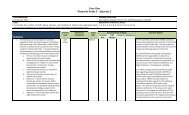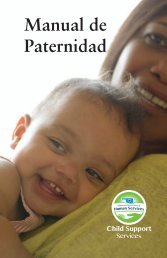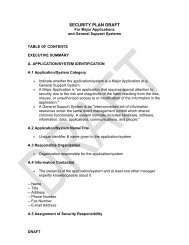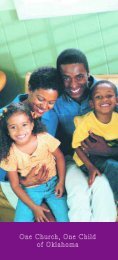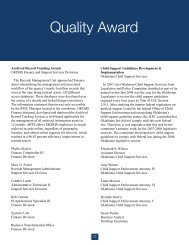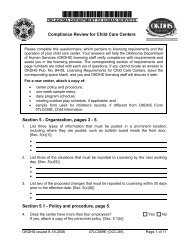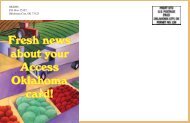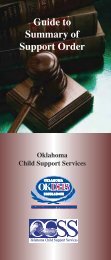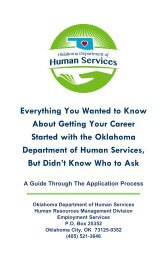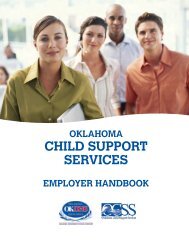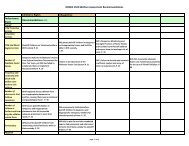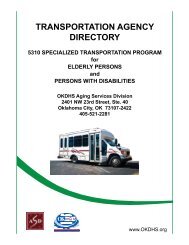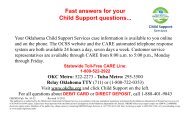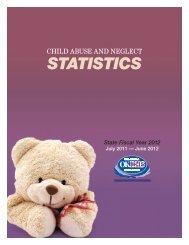The Oklahoma Pinnacle Plan - Oklahoma Department of Human ...
The Oklahoma Pinnacle Plan - Oklahoma Department of Human ...
The Oklahoma Pinnacle Plan - Oklahoma Department of Human ...
Create successful ePaper yourself
Turn your PDF publications into a flip-book with our unique Google optimized e-Paper software.
<strong>The</strong> <strong>Oklahoma</strong> <strong>Pinnacle</strong> <strong>Plan</strong>:<br />
An Improvement <strong>Plan</strong> for Child Welfare Services<br />
APPENDICES<br />
March<br />
2012<br />
Appendix D – Child Welfare Practice Standards<br />
CHILD WELFARE PRACTICE STANDARDS<br />
1. We continually examine our use (misuse) <strong>of</strong> power, use <strong>of</strong> self and personal biases<br />
We must be aware <strong>of</strong> and recognize how we use the power <strong>of</strong> the position.<br />
Our use <strong>of</strong> team supports the process <strong>of</strong> examining personal biases and use <strong>of</strong> self.<br />
We believe in the importance <strong>of</strong> hearing all voices—whether we disagree or not.<br />
We continually assess our personal biases and styles, ensuring that they do not<br />
interfere with our ability to partner with families; at the same time we will regularly<br />
enter into discussions/mentoring with our supervisor (at all levels) about personal<br />
biases and the way they are impacting our work.<br />
We allow ourselves to imagine and feel the experiences <strong>of</strong> families as we work to assist<br />
them in accomplishing their goals.<br />
It is critical that families see and believe that we are genuine and that we care.<br />
2. We respect and honor the families we serve<br />
We separate what parents have done from who they are.<br />
o Address the issues instead <strong>of</strong> judging.<br />
o Behave as if you are a visitor in the family’s home - a visitor with a purpose.<br />
o Learn about their life demands and value their time.<br />
o Be humble, understanding that “any given day” it could be us.<br />
We hold a belief that people can change - with the right tools and resources.<br />
3. We listen to the voice <strong>of</strong> children<br />
We have frequent and meaningful conversations with children about what they need to<br />
feel safe, using language and making decisions that respects their love for their family<br />
and their need for connection to their culture.<br />
We ensure that children have accurate information and understand what is happening<br />
in their lives.<br />
We actively find ways for children to contribute and have an influence and a sense <strong>of</strong><br />
control on the decisions made about their lives; being honest about their options and<br />
choices.<br />
We frequently engage children in conversations about how to improve our system.<br />
4. We continuously seek to learn who families are and what they need<br />
We do not make assumptions about families. <strong>The</strong>y are the expert <strong>of</strong> their own lives and<br />
<strong>of</strong>ten have solutions to their own problems. We create an environment where families<br />
can teach us about who they are and what they need.<br />
We communicate with families in their primary language in order to understand their<br />
experiences, their culture and how they make parenting decisions.<br />
Appendix D – Child Welfare Practice Standards - 27 - | P a g e



